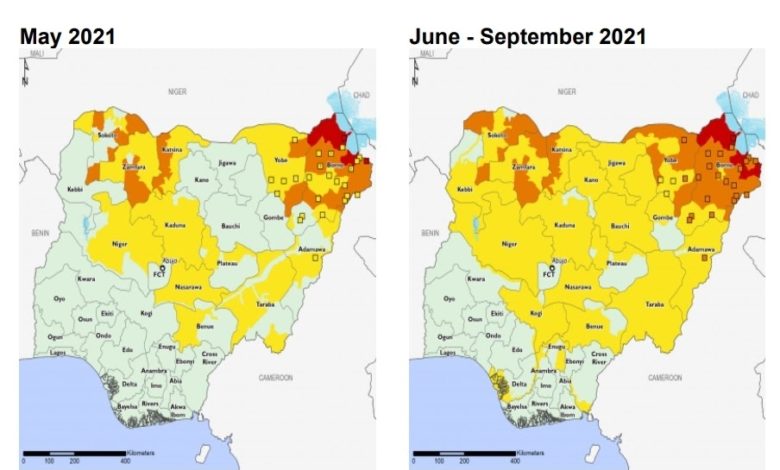Food Security: Nigeria Faces Scarcity Due To Conflict, Poor Macroeconomic Performance – Report
A new report by Famine Early Warning System Network has spotlighted trends posing threat to food security in Nigeria.

A recent report published by Famine Early Warning System Network (FEWS NET ) has raised an alarm over the impacts that erratic rainfall, poor macroeconomic conditions, and violence in parts of Nigeria may have on the country’s agricultural activities and food security.
FEWS NET was established in 1985 by the United States Agency for International Development (USAID) after devastating famines in East and West Africa. The US funded activity provides objective, evidence-based analysis to help government decision-makers and relief agencies plan for and respond to humanitarian crises.
According to the report, despite the slight increase in crude oil production and international crude prices from March to April, poor macroeconomic conditions persist in the country.
“The National Bureau of Statistics indicates the annual inflation rate dropped by .05 per cent from March to 18.12 per cent in April. This is the first decline in inflation since the closure of the land borders in about 20 months,” the report indicates.
According to the report, the value of the Naira continued to depreciate and traded at 482 to the U.S dollar in the parallel market in mid-May.
“The Central Bank did not report the official exchange rate in May, leading to some speculation by investors that the government may unify the multiple exchange rate, which will likely increase foreign investment. As a result, atypically high food prices, lower household purchasing power, and reduced market access persist.”
On security, FEWS NET said the security situation in the Northeast continues to deteriorate, leading to an increase in the population who have been displaced multiple times, further constrained humanitarian access, and persistent restricted engagement in livelihood and income-earning activities.
The report quoted the International Organisation for Migration (IOM), which stated that “as of Feb, over 2.1 million people are displaced across the six northeast states, “an increase of about two per cent relative to December 2020. Conflict between March and May in Dikwa, Marte, Mobbar, and Kaga LGAs in Borno State led to the multiple displacement of about 50,000 people.”
“Similar attacks in Geidam and Yunusari LGAs in Yobe State in April and May resulted in the displacement of another 180,000 people.”
The persistent attacks in the Northeast are limiting humanitarian access and delivery of badly needed aid to affected households.
“A risk of famine (IPC Phase 5) persists in a worst-case scenario if households are cut off from their typical food and income sources and humanitarian assistance for a prolonged period of time.”
HumAngle has published reports on the over a decade long insurgency and violence ravaging the Northeast and attacks on communities and commuters by criminals and terror groups operating in the Northwest.
The FEWS NET report also noted that insecurity in the northwestern, north-central, southeastern, and southwestern areas of the country are leading to high displacement and many are in search of new income-earning opportunities and food sources.
It cited the UNHCR report in February, which stated that over 63,000 Cameroonian refugees are residing in Akwa Ibom, Benue, Cross River, and Taraba states. Many of these households have resorted to petty trading and unskilled labour to earn little income, depending mainly on markets to access food.
“This, combined with atypical staple prices, is driving Crisis (IPC Phase 3) and Stressed (IPC Phase 2) among conflict-affected households outside the northeast.”
The report highlighted the erratic rainfall witnessed at the start of the season.
“Some early-season negative anomalies have been observed across much of the central and southern areas of the country.”
It also said the early season deficits are not of significant concern due to the favourable 2021 seasonal forecast. However, the rainfall deficits in southwestern areas have negatively impacted newly planted crops, including cassava, yams, and maize, causing some wilting, the report said.
“Farmers in these areas will likely replant when steady rainfall occurs in the coming weeks. In central areas of the country, land preparation activities are ongoing, with a likely timely start to the season in late.”
Additional reporting by Murtala Abdullahi
Support Our Journalism
There are millions of ordinary people affected by conflict in Africa whose stories are missing in the mainstream media. HumAngle is determined to tell those challenging and under-reported stories, hoping that the people impacted by these conflicts will find the safety and security they deserve.
To ensure that we continue to provide public service coverage, we have a small favour to ask you. We want you to be part of our journalistic endeavour by contributing a token to us.
Your donation will further promote a robust, free, and independent media.
Donate HereStay Closer To The Stories That Matter




